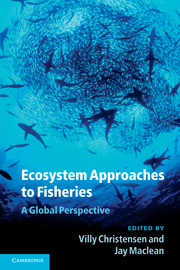Preface
Published online by Cambridge University Press: 05 June 2012
Summary
The need to move from a sectoral to an ecosystem approach in the management of fisheries has become compelling in recent years. Many elements of ecosystem-based management (EBM) of fisheries have been identified but implementing them has proven to be elusive. Management of the oceans' fisheries on an ecosystem basis entails ecosystem-based management of the oceans themselves and, given the diversity of fisheries and marine ecosystems, there is no single recipe toward this end. In this book, we present a broad collection of the elements and some of the recipes for ecosystem-based management. We believe it is one of the first books to deal with this approach to management of the oceans.
This book was inspired by a founding father of research on ecosystem-based management, Daniel Pauly. When he was awarded the 13th International Cosmos Prize late in 2005, Amanda Vincent and Villy Christensen obtained support from the University of British Columbia (UBC) – where Pauly was Director of the Fisheries Centre – for a symposium to honor him for receiving the Cosmos Prize and to be held at the Fisheries Centre on the occasion of his 60th birthday, May 2, 2006. With UBC's generous support, we were able to invite a number of prominent scientists and policymakers with whom Pauly has worked during his career to give presentations at the one-day symposium, which was titled, “Thinking Big: A Global Look at Fisheries Science.”
- Type
- Chapter
- Information
- Ecosystem Approaches to FisheriesA Global Perspective, pp. xiii - xivPublisher: Cambridge University PressPrint publication year: 2011



